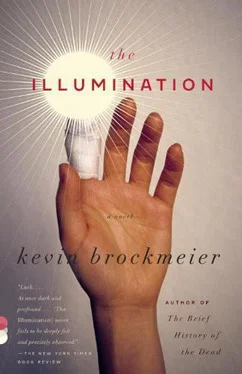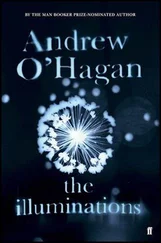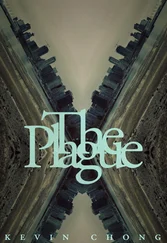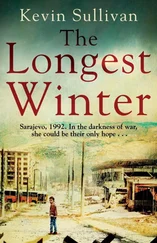The sun had fallen behind the audience. In the deepening shade of the room, it was easy to see their wounds and contagions: the wrenched backs and sciatic hips, the legs cramped with heat lightning, a glittering pathology of sprains, rashes, and carcinomas. Nina sat at the table by the lectern and signed the books she was handed—a half-dozen Girls and Boys and twice that many Twin Souls , plus a mint-edition copy of her ancient small-press poetry chapbook, Why the House Loves the Fire , preserved in an acetate sleeve for the store’s first-editions case.
She had spent too much time talking and had worn the seal off her ulcer. She could feel it shining through her lips. You’ve been stung by a bee or a wasp before, haven’t you? she answered. You know how at first it’s only a faint irritation, and you can almost disregard it, but then the venom spreads and suddenly, in the smallest division of a second, the injury blossoms open and becomes alarmingly, almost hyperphysically, bright? Well, it was like that blossoming-open moment, continually renewing itself, for days and days. Yes , she answered, she had seen a doctor about it. The problem was that nobody knew what caused them. Rumors , she answered. Rumors and folk remedies. Flaxseed oil. L-lysine. Hydrogen peroxide. Warm saltwater. For a while she had tried burning them closed with a sulfuric acid compound that left a cap of white crust over the top, but every time she used it her mouth filled with the sickening taste of aluminum foil, and often the sores would keep expanding underneath the cauterant and absorb it anyway. All the time , she answered. Because words on paper didn’t hurt. No , she answered. No. They had made a ruin of everything she cared about. She didn’t want adulation anymore. She didn’t want love. She only wanted to carve a small path of painlessness and blunted feeling through her life until she came out the other side .
Back at the hotel, before she phoned Wallace, she stood at the mirror practicing her diction. “Hello. Hello. M ake m e b etter. M ake m e b etter. This is your m other. M other. Mother.” She would wait for him to ask her how she was doing, and “I’m better,” she would say. Which was true, or very nearly. She would be better soon. She was sure of it. The trick was to speak deliberately enough to rid her consonants of that lunging electric quality that gave her condition away, but not so deliberately that it sounded unnatural or calculated. Even the slightest measure of strain in her voice, and Wallace would pick up on it. He was like a hero in a classic detective novel: Father Brown, Hercule Poirot. She worried sometimes that she had passed her syndrome along to him, that one day in his mid-thirties he would wake to discover that his immune system had broken apart inside him like a crossette, bursting open in an eruption of pus and cankers, and everything he loved had become difficult. She hoped the thought would never occur to him. She didn’t want him to dread growing up.
She called her home number. Someone answered on the first ring, speaking with the heavy gravel of a smoker or a barroom blues singer. She thought she heard him ask, “Who am I, and how can I help you?” but in the initial air pocket of the connection, she might have been mistaken.
“I’m sorry?”
There was a whispered flurry of dudes , and then the man said, “This is the wrong number. Say good-bye. Hang up,” and the line went silent.
She stared at the phone. After a few seconds, the LCD became dim from inactivity, and her face peered back at her with the blank puzzlement of a prisoner in a cage. She pressed redial. Her home number marched across the screen, appearing digit by digit beneath the phone icon transmitting its telepathy waves.
This time Wallace answered. “Hello?”
“ Wallace. What is going on?”
“Hey, Mom. Nothing. Just me and the campaigners are taking a break. What’s up?”
“Who was that man who answered our phone?”
“Man?”
“Wallace, I just called you, and a man just picked up.”
She could always tell when he was lying by the seesawing quality of his voice, as if some hidden athletic force were propelling his sentences up and then catching them as they fell back down. “I don’t know. You must have dialed the wrong number or something.”
“I pressed redial.” In the background the same deep voice that had spoken to her earlier said something like wonder who or hundred and two before the others hushed him. “ Him. That man.”
Wallace paused. “Okay. Listen,” he said. “Don’t freak out. There’s this guy we met. He sells books from a blanket over by that Chinese place. Mom, I’m telling you, he had a first-edition Cities in Dust manual, still in the wooden box, with both the Twelve Nations supplement and the original Gazetteer. We’re negotiating the price down, that’s all.”
“Out! Get him out of our house!”
“Give us just a… second… more,” Wallace told her, “and we’ll be—”
She heard someone say, “All right, man. You can have that one and one other. But that’s it.”
“—almost—”
“Kendall Wallace Poggione!”
“Finished,” Wallace concluded.
“Now!”
“Okay, okay, we’re done. Jesus! Problem solved. He’s leaving.” The front door opened and closed, its damaged hinge clacking against the frame. With a cavernous sigh her son declared, “You know, Mom, just because your life frightens you doesn’t mean my life has to frighten me.”
The next day, a message came while she was sitting on her front steps. She glanced away for a moment, and there it was, nestled in the thick fringe of grass around the fissure, like a mushroom springing up after a thunderstorm. I love you , it read, and I want you to join me. I want us to be together again, my jewel, my apple. Whatever the cost, I want it, I want it. And I don’t want to wait until you die, because God knows how long that will be .
It was his longest letter yet. She sensed that every word had demanded some mysterious payment from him, a fee that could be understood only by those who had already been laid to rest. What was he asking? That she end her life? That she suspend it? Or something else altogether, something she could hardly imagine?
For the next few days he left no love notes in her yard, no entreaties, only a single question that appeared late one night on the back of a chewing gum wrapper: Hello?
He was giving her time to think. He was waiting for her belowground—she knew it, she knew it. Every day the crack by her porch grew a little larger. At first it was only a chink in the dirt, no wider than the slot where she dropped her mail at the post office, but gradually it stretched open until it was as big as an ice chest, and then a steamer trunk, and then a gulf into which she could easily have fit her entire body. She wondered what it would be like if she accepted his invitation. She began to dream that she was living beneath the field on the far side of the woods, moving through a long procession of rooms and hallways where the dead milled around like guests at a trade convention. Throughout the day, at various angles, the sun pierced the hills and the pastures, sending bright silver needles through the ceiling of the earth, so that it was never completely dark, and at night, when the land was soaked in shadows, the people around her glowed with a strange heat. She watched them flare and shimmer through their skin, their bones going off like bombs, every limb a magnificent firework of carbon, phosphorus, and calcium. It seemed that the surface of the world had two sides: on one were the bereaved spouses, the outcast teenagers, the old men and women who had no one left to reminisce with, and on the other were the lovers and friends and parents they had outlived—all of them, whether above or below, aching for those who were gone; all of them, whether above or below, pressing their fingers to the soil. Her eyes flickered in her face, and her teeth shone in her mouth, and when she woke, before the dream had lost its color, she felt that she was recalling some earlier existence, like a house she had lived in as a child, familiar down to its last curved faucet and last chipped floorboard.
Читать дальше












